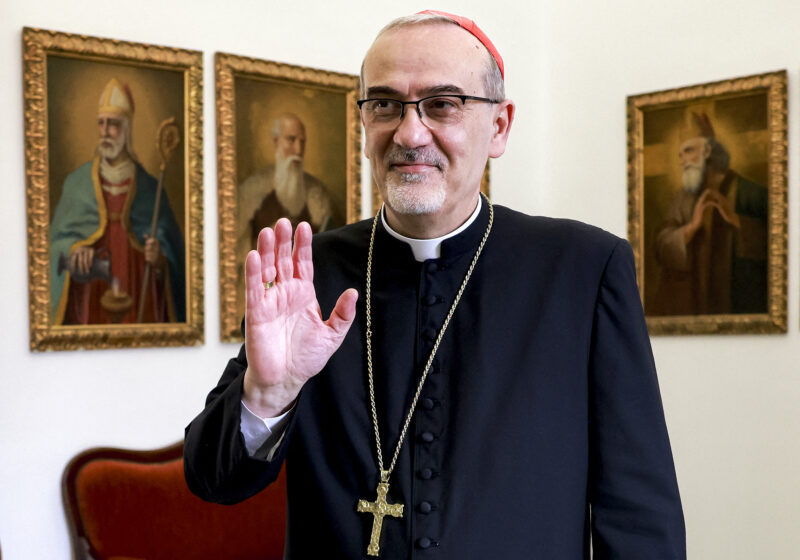After Eli Sharvit’s writings about Trump resurfaced, Sen. Lindsey Graham called his appointment ‘beyond problematic’

ANDREW CABALLERO-REYNOLDS/AFP via Getty Images
President Donald Trump (R) meets with Israel's Prime Minister Benjamin Netanyahu in the Oval Office of the White House in Washington, DC, on February 4, 2025.
Israeli Prime Minister Benjamin Netanyahu announced on Tuesday that he was withdrawing the appointment of former Israeli Navy commander Eli Sharvit as the next chief of the Shin Bet, following pushback in the governing coalition as well as a public rebuke from Sen. Lindsey Graham (R-SC) over Sharvit’s past comments criticizing President Donald Trump.
Netanyahu announced early Monday that Sharvit was his choice to head the internal security agency — pending a Supreme Court case relating to the prime minister’s firing of Shin Bet head Ronen Bar.
The following morning, the prime minister released a statement that he had told Sharvit that “after further consideration, he intends to consider other candidates.”
Within hours of Sharvit’s appointment being announced, Cabinet ministers and Likud Knesset members came out against Sharvit, because, after his retirement from the military, Sharvit had participated in protests against Netanyahu’s policies.
Israeli Heritage Minister Amichay Eliyahu wrote in a post on X that “the main difficulty with Ronen Bar’s conduct is not the persona but the Kaplanist [anti-Netanyahu protester] worldview … Replacing a person with a Kaplanist worldview with another person with a similar worldview does not solve the problem but only perpetuates it.”
Hours later, Graham provided Netanyahu’s base with another reason to oppose Sharvit: He once recently spoke out against Trump.
Sharvit published an op-ed in January lambasting the 47th president’s environmental policies as short-sighted and profit-driven rather than focused on addressing climate change. “We live in an era where the public demands more accountability from governments and corporations. Trump’s choice to ignore these demands sends a message to the world that the United States is shirking its global leadership,” Sharvit wrote in the Jan. 23 piece, published in Calcalist.
“American leadership on climate and the environment failed under the previous Trump administration, and now it is our responsibility to ensure that it does not fail again,” Sharvit continued.
Graham wrote on X on Monday morning that Israeli leaders should rethink Sharvit’s hiring, which he described as “beyond problematic” because of the former naval commander’s past criticism of Trump.
“While it is undeniably true that America has no better friend than Israel, the appointment of Eli Sharvit to be the new leader of the Shin Bet is beyond problematic. There has never been a better supporter for the State of Israel than President Trump. The statements made by Eli Sharvit about President Trump and his policies will create unnecessary stress at a critical time,” Graham said.
“My advice to my Israeli friends is change course and do better vetting,” he continued.
Soon after, political analysts speculated on Israeli evening news that Graham was doing Netanyahu a favor that was likely coordinated, giving the prime minister a reason to reverse Sharvit’s appointment — because it may offend Trump — that would be more broadly accepted than doing so because of the former naval commander’s participation in protests against Netanyahu.
Responding to that chatter, the South Carolina senator wrote on X later Monday, “To my friends in the political punditry world in Israel: If you think the over the top criticism levied against President Trump’s energy policy by the Shin Bet nominee is no big deal, you have missed a lot.”
The post contained a screenshot from Sharvit’s Calcalist piece alleging Trump had “chosen to abandon critical net-zero emission targets for 2050 and focus on promoting polluting fuels, driven by a short-term conservative perspective aimed at maximizing immediate profits.”
“I believe that this policy is not just misguided but dangerous. Trump’s shortsightedness sends a shocking message of disregard for scientific reality, human well-being, and responsibility toward future generations. This approach is essentially a political version of ‘eat and drink, for tomorrow we die’ – an attempt to evade global consequences by prioritizing the immediate interests of polluting fuel industries,” Sharvit wrote.
Netanyahu fired Shin Bet chief Bar earlier this month, citing a lack of trust, while opposition figures accused the prime minister of pushing Bar out for political reasons.
There have been several petitions to the Supreme Court against the firing, and the court plans to hold a hearing on April 8. In the meantime, the dismissal is frozen, but Netanyahu has still been allowed to interview potential successors to Bar.
The prime minister said on Monday morning that he chose Sharvit out of seven candidates and that he was “convinced that Vice-Admiral Sharvit is the right person to lead the Shin Bet on a path that will continue the organization’s glorious legacy.”
This story was updated at 1:48 a.m. E.T.
Dermer’s ascension highlights the growing rift between the Israeli prime minister and the military and intelligence establishment

Michael Brochstein/SOPA Images/LightRocket via Getty Images
Ron Dermer, Israeli ambassador to the United States, seen speaking during the American Israel Public Affairs Committee (AIPAC) Policy Conference in Washington, DC.
Israeli Prime Minister Benjamin Netanyahu’s decision to appoint Strategic Affairs Minister Ron Dermer — his elusive close political confidante and advisor — as the head of Israel’s hostage negotiations team touched off a political controversy in the country that underscores why Netanyahu selected him for the role.
By putting Dermer at the helm of the sensitive talks, Netanyahu ensured the negotiations are led by someone he trusts to align the Israeli team with the prime minister’s position: that the war against Hamas in Gaza cannot end unless his definition of “total victory” is achieved and the terror group is removed from power. The prime minister also hopes to plug the incessant leaks that have plagued the process.
Dermer’s new position was leaked to the press earlier this month when Netanyahu was in Washington, but it became official last week. Dermer entered the negotiations as the first phase of the cease-fire and hostage-release deal was winding down, with the clock ticking to secure an agreement on phase two. Dermer arrived in Washington days later for meetings with President Donald Trump’s Mideast envoy, Steve Witkoff.
A source with knowledge of the issue, who was granted anonymity to discuss the delicate situation, said that Netanyahu appointed a new lead negotiator “because this is a different negotiation with a new president of the U.S. The Biden deal is no longer valid. [The Trump administration] is backing Israel on everything, and I think that puts things in a different position. The Biden administration wasn’t backing us; they wanted a cease-fire. They didn’t care if Hamas remained in Gaza.”
Phase two of the cease-fire would involve ending the war, something that the government of Israel does not want to do because — as seen in the macabre displays of the handover of hostages — Hamas has not been eliminated as a governing or military force, even as it has been significantly weakened.
Israel would prefer to extend phase one, exchanging dozens of Palestinian terrorists and security prisoners for each hostage. Foreign Minister Gideon Sa’ar told Jewish Insider last Thursday, “Theoretically, it’s within the framework [of phase one]. This option exists.” He estimated that there are 21 living hostages in Gaza, though there are 24 hostages who have not officially been declared dead.
A source familiar with the view in the Prime Minister’s Office told JI this week that the members of the previous team “were terrible negotiators, just terrible. They didn’t get the idea you’re supposed to bargain, not ‘whatever you want, whatever conditions’ [to bring back the hostages]. Now, you don’t have any leaks — everything was leaking before. It’s like [the previous team] were on a different side or something.”
One challenge Dermer will face in the negotiations will be convincing Hamas to continue those lopsided trades without the promise of Israel ending the war. Hamas views the hostages as the terror group’s best leverage to get what it wants: Hamas’ survival and a complete Israeli withdrawal from Gaza.
***
Mossad chief David Barnea led the talks before Netanyahu replaced him with Dermer. Shin Bet chief Ronen Bar and IDF representative Maj.-Gen. Nitzan Alon were also on the team, and Netanyahu repeatedly sent with them his diplomatic advisor, Ophir Falk, to the talks in Cairo and Doha, Qatar.
The security chiefs often disagreed with Netanyahu about how the negotiations were handled, and there were frequent leaks to Israeli media from the previous team portraying the prime minister as obstructive.
“A senior source familiar with the details” of the negotiation sent a statement to reporters last week indicating that this was Netanyahu’s reason for replacing them with Dermer. The source said that “the achievement of the agreement to release six of our living hostages at one time” last Saturday — as opposed to the three originally planned — “is the result of the prime minister’s decision to change the makeup of the negotiating team. The new team changed the dynamic and led negotiations instead of concessions. It also stopped the practice of regular and biased briefings against the prime minister and the political echelon that only caused Hamas to entrench its position and add demands.”
Anonymous security officials pushed back in Hebrew media, calling the claim “a disgrace” and arguing that the sped-up hostage release was an option previously written into the deal. Yair Lapid, the opposition leader, and National Unity party leader Benny Gantz railed against Netanyahu for undermining the defense establishment.
Labor MK Merav Michaeli, a member of the Knesset Foreign Affairs and Defense Committee, said that “obviously [Dermer is] the go-to person as far as Bibi is concerned, and he is extremely well-connected in the [Trump] administration, so by all means, appoint a capable person who is well-connected and can get stuff done. But why does this have to include removing the professionals who are the ones with all the mileage, experience and knowledge?”
The Hostages and Missing Families Forum called on everyone sparring publicly to “stop this behavior immediately” and focus on the fate of the hostages.
The source familiar with the view in the Prime Minister’s Office told JI this week that the members of the previous team “were terrible negotiators, just terrible. They didn’t get the idea you’re supposed to bargain, not ‘whatever you want, whatever conditions’ [to bring back the hostages].”
“Now, you don’t have any leaks — everything was leaking before. It’s like [the previous team] were on a different side or something,” the source added.
Labor MK Merav Michaeli, a member of the Knesset Foreign Affairs and Defense Committee, said that “obviously [Dermer is] the go-to person as far as Bibi is concerned, and he is extremely well-connected in the [Trump] administration, so by all means, appoint a capable person who is well-connected and can get stuff done.”
“But why does this have to include removing the professionals who are the ones with all the mileage, experience and knowledge?” Michaeli asked.
Michaeli also pointed out that “the negotiation is not with the Americans, it’s with Hamas, Egypt and so forth, and theirs is a language Dermer doesn’t speak … Why throw out the people who know how to talk with the Arab side — Bar and Barnea?”
“The inevitable conclusion is that Netanyahu’s aim is not to bring back hostages … It is to remain prime minister, whether from reigniting the war in Gaza or another way,” she said.
***
Dermer, the former Israeli ambassador to the U.S., played a role in advancing hostage deals even before he led the negotiations. He was instrumental in convincing the Cabinet to accept the first cease-fire in November 2023, in which over 100 hostages were freed.
Shortly after Trump was reelected, he told Israeli President Isaac Herzog in a call that he thought nearly all of the hostages were dead, and Herzog told him he was mistaken. Dermer visited Trump in Mar-a-Lago days later to share Israeli intelligence that most of the hostages were alive, JI has learned.
“This is the highest moral imperative: to rescue them from the tunnels of hell,” Mossad chief David Barnea told the Institute for National Security Studies’ Annual Conference. “There is no greater feeling — not even when carrying out a highly impactful operation — than the sense of duty and purpose in bringing the hostages home.”
At the same time, Dermer has a proven record of loyalty to Netanyahu in the face of public pressure regarding the hostages. Protesters stand outside Dermer’s house regularly — in a group chat viewed by JI, they talked about having followed him to synagogue and the gym — but it has not swayed him from being Netanyahu’s loyal soldier.
In a heated security cabinet meeting in August, from which there were extensive leaks to the media, Dermer took Netanyahu’s side against the security establishment that sought further concessions to reach a hostage deal. Netanyahu wanted the ministers to vote that the IDF’s continued presence along the Philadelphi Corridor between Gaza and Egypt must be a condition of a hostage deal. IDF Chief of Staff Herzi Halevi and Mossad head Barnea argued that it was unnecessary. Then-Defense Minister Yoav Gallant reportedly shouted: “You are voting that if we decide that there are two options — either stay in Philadelphi or bring back hostages — you are deciding to stay in Philadelphi. Does that seem reasonable to you? There are people alive there!”
Dermer reportedly responded: “The prime minister can do what he wants.”
Barnea continued to push back against Netanyahu’s approach after being replaced as chief negotiator, telling the Institute for National Security Studies’ Annual Conference on Tuesday that returning the hostages has been his “foremost mission since Oct. 7.”
“This is the highest moral imperative: to rescue them from the tunnels of hell,” Barnea said. “There is no greater feeling — not even when carrying out a highly impactful operation — than the sense of duty and purpose in bringing the hostages home.”
Commenting on Barnea’s remarks, Michaeli said: “You understand his priorities and the prime minister’s are not aligned. The person brought to be in charge of the negotiations is the one implementing Netanyahu’s priorities.”
***
Trust is also key in Netanyahu’s choice of Dermer to lead the negotiations. Netanyahu has gone through dozens of advisors in his four decades in politics, and many have left only to speak out against him and, in some high-profile cases, run against him in elections.
Dermer, however, has been advising Netanyahu since 1999. He has, over the years, been called “Bibi’s brain,” and “the son Netanyahu wishes he had” (Netanyahu has two sons, Yair and Avner, as well as a daughter, Noa, from a previous marriage).
Netanyahu’s deep trust in Dermer is partly because he has proven less susceptible to public pressure than others in similar positions. Dermer shies away from the media and the public, has never run for office, and even now, when he is a Cabinet minister, operates like Netanyahu’s top advisor and envoy.
In a segment titled “Who are you, Ron Dermer?” on Israel’s most-watched news program last November, former Netanyahu Chief of Staff Ari Harow said that “one of the unique things about Ron is he never had his own political aspirations. He isn’t looking for promotions or titles. He’s not looking for a place in politics for himself; he is looking to help the State of Israel.”
Dermer gives even fewer interviews than Netanyahu, and only to foreign media. The most recent Hebrew interview Channel 12 could find for the segment about Dermer was from 2010.
As such, the minister is unknown to most Israelis. At the beginning of the segment, journalists walked around Jerusalem’s Machane Yehuda market with photos of Dermer and asked shoppers to identify him. Only two could — and they had accents from English-speaking countries. A recent sketch on “Eretz Nehederet,” Israel’s version of “Saturday Night Live,” featured the show’s first-ever impression of Dermer in honor of his appointment as the top hostage negotiator. The thrust of the sketch was his lack of communication with the Israeli public. The way they portrayed him — as somewhat of a frat boy and a sycophant to Netanyahu’s wife, Sara, and son, Yair Netanyahu, of whom he is known to steer clear — betrayed the writers’ unfamiliarity most of all.
Dermer has given one speech in the Knesset plenum, a rare occasion in which lawmakers availed themselves of the legislature’s tools to require him to appear before them. He has limited his submission to parliamentary oversight to the Knesset’s confidential Subcommittee on Intelligence.







































































